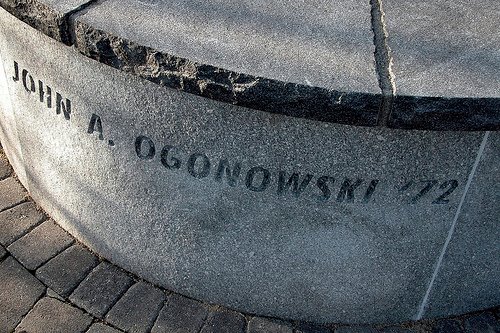
UMass Lowell's 9/11 Memorial honoring my fraternal brother: John 'Oggie' Ogonowski
THE GENTLEMAN FARMER -- John 'Oggie' Ogonowski
January 31, 2012
...in 2001, American Airlines pilot John Ogonowski made the familiar drive from his farm in Dracut to Logan airport. He was sorry he would miss a special event scheduled for later that day. Federal officials were coming to inspect the work of Cambodian immigrant farmers who leased land from Ogonowski. A fourth-generation Massachusetts farmer, he was an active participant in the New Entry Sustainable Farming Project which helps immigrants carry on their agricultural traditions, while protecting farmland from development. When the officials arrived at the farm, they learned that the plane Ogonowski was piloting had been hijacked and flown into the World Trade Center. The New Entry Sustainable Farming Project continues, a living memorial to John Ogonowski.
John Ogonowski was the fourth generation of his family to till White Gate Farm in Dracut, a place he dearly loved. He grew up working the farm, but left home in 1972 to join the Air Force. After serving in Vietnam, he became a commercial pilot. When he married, he brought his wife Peggy home with him to the family's farm. There the couple raised three daughters.
Twelve days a month, he donned his senior captain's uniform and flew jumbo jets for American Airlines. The rest of the month he wore jeans and a flannel shirt as he tended the 150-acre hay and vegetable farm, read agricultural journals, and worked to preserve what was left of Dracut's farmland.
His great-grandfather had immigrated from Poland at the turn of the century and settled in the Merrimack Valley, just north of Lowell. The local farmers were welcoming, sharing their knowledge, lending tools, and helping the newcomers as they settled in. By the time John grew up, members of his extended family lived on farms all around him.
But in the 1980s, suburban development pressures reached Dracut, and subdivisions began to appear in fields that had been farmed only the year before. John Ogonowski actively resisted development.
"When you plant a building on a field," he would say, "it's the last crop that will grow there."
In 1998 he helped found the Dracut Land Trust, which worked to conserve the town's open space and farmland. But he realized that preserving the land would not necessarily preserve the agricultural heritage of the area. As the bumper sticker on his pickup said, "There is no farming without farmers." John Ogonowski wanted to bring people back into farming.
So did Paul Fischer of the Farm Service Agency in Westford. In 1998 Fischer was looking for land that Southeast Asian families living in Lowell could farm. These recent immigrants wanted both to reconnect with their agricultural traditions and to produce Asian vegetables not available in conventional supermarkets. When Ogonowski learned of Fischer's project, he immediately saw an opportunity to provide these newcomers with the kind of help his great-grandfather had received from his Yankee neighbors, while also increasing the number of farmers in his part of the state.
Ogonowski became deeply involved with the New Entry Sustainable Farming Project, which matched immigrant growers with mentors who would lease them small plots of land, teach them how to adapt their methods to New England conditions, and support their efforts to grow produce for local markets. He leased 12 acres to seven different families, although he rarely collected the $200 rent. He made his own farm the first all-commercial "mentor farm," a training site for beginning growers. He involved himself in every aspect of the enterprise, ploughing and harrowing the immigrants' plots, providing compost and supplies, setting up an irrigation system, building a greenhouse, repairing machinery, and providing advice.
The program was a success. Cambodian immigrants grew bok choi, water spinach, lemon grass, pigweed, Asian basil, Asian squash, coconut amaranth, pickling spices, pea tendrils, and other vegetables from their homeland. They found buyers not only in nearby immigrant communities but in Boston's high-end restaurants. One farmer reported making a profit of $5000 from a three-acre plot; others talked of the joy and sense of connection that farming brought them. NouChea Kim of Lawrence, a Cambodian refugee who leased land from Ogonowski, said "Farming connects me to the land and reminds me of my parents. I do this to help the next generation know their roots." In 1999 Ogonowski told The Boston Globe, "These guys are putting more care and attention into their one acre than most Yankee farmers put into their entire 100 acres."
As the 2001 harvest approached, a group of government officials was slated to visit the Ogonowski farm. On the morning of September 11th, the immigrant farmers were preparing a special luncheon when news that John Ogonowski had been killed at the World Trade Center reached White Gate Farm. Shocked and grief-stricken, they left the farm. For a week, it remained closed.
But the Ogonowski family was determined that John's dream would not die. Ogonowski and other members of the Dracut Land Trust had been working to raise $760,000 to purchase a 33-acre farm that was slated to become a golf course and houses. John's sister Carol contacted Sen. Edward Kennedy and Rep. Martin Meehan for help. Within a year, the two congressmen had secured federal funds for the Dracut Land Trust to purchase the farm, on the condition that it would be leased to Asian immigrants. Two years after the September 11th attacks, the farm was dedicated as a living memorial to John Ogonowski.
Source: MassMoments.org

UMass Lowell's 9/11 Memorial honoring my fraternal brother: John 'Oggie' Ogonowski